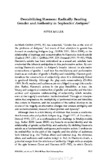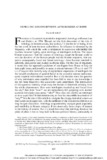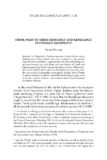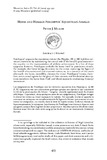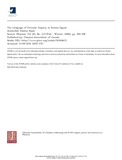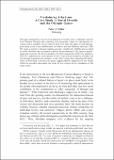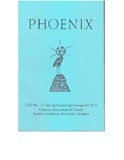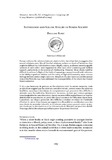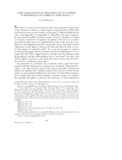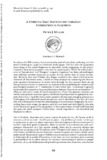Browsing Department of Classics by Title
Now showing items 2-11 of 11
-
Destabilizing Haemon: Radically Reading Gender and Authority in Sophocles' Antigone
(Helios (Texas Tech University Press), 2014) -
Expelling Misconceptions: Astrologers at Rome
(Classical Philology / University of Chicago Press, 2011)"The views ... that the science of astrology swept the Roman world to win the devotion of the Roman people and the Roman emperors, that emperors consequently loved and feared astrology -- have become standard in scholarly ... -
From oikos to polis: Ideology and Genealogy in Pindar's Olympian 9
(Syllecta Classica, 2015)In Olympian 9, Pindar constructs a family for his victor, Epharmostos, whose family does not—contrary to the generic expectations of epinikian—appear in the ode. By establishing connections between the early ethnic and ... -
Horse and Herald: Posidippus' Equestrian Angelia
(University of Toronto Press, 2019)Posidippus’ epigrams for equestrian victors (the Hippika, AB 71–88) build on epinician convention by maintaining the central role of the herald’s proclamation— the angelia—in the representation of athletic achievement. In ... -
The Language of Oracular Inquiry in Roman Egypt
(Phoenix / Classical Association of Canada, 2006)The language of oracular inquiries in Roman Egypt changed from Demotic to Greek because of the insistence of the Roman authorities, not, as historians have previously supposed, because of a preference for Greek on the part ... -
Proclaiming Arkadians: A Case Study in Social Identity and the Olympic Games
(Weidmann, 2022)This paper analyzes the role of social and political identity in two Arkadian epigrams from Classical Olympia. By examining these epigrams in light of contemporary so-ciology and as complex literary texts in their own ... -
Roman Women, Wise Women, and Witches
(Phoenix / Classical Association of Canada, 2016)In this article I explore the connections among the physiological effects of envy, the stereotypes that adhered to old women, and the literary representations of witches in Roman society, arguing that it is possible to get ... -
Sisterhood and Sibling Rivalry in Roman Society
(University of Toronto Press, 2019)Roman evidence for relations between sisters is thin, but what there is suggests that sororal relations were, like all familial relations, subject to ideals of behaviour that might be difficult for individuals to attain. ... -
Some Observations on Procopius’ Use of Numbers in Descriptions of Combat in Wars 1-7
(Classical Association of Canada, 2015) -
A Sympotic Self: Instruction through Inebriation in Anacreon
(Mouseion, 2018-03)As early as the fifth century, Anacreon was the poet of wine, love, and song; even his death—choking on a pip—is attributed to the grape. The fact that the symposion looms large in the extant fragments is, therefore, ...

